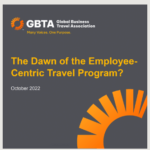 A new research report – “The Dawn of the Employee-Centric Travel Program” – released today by the Global Business Travel Association (GBTA), the world’s largest business travel association, and Deem, a leading mobile-first corporate travel management software provider, explores the current state and role of the employee experience when it comes to managed corporate travel.
A new research report – “The Dawn of the Employee-Centric Travel Program” – released today by the Global Business Travel Association (GBTA), the world’s largest business travel association, and Deem, a leading mobile-first corporate travel management software provider, explores the current state and role of the employee experience when it comes to managed corporate travel.
Asked to select up to three perks they most want their company to offer (out of seven options), business travellers most commonly choose:
46%: freedom to book with their favourite travel suppliers
43%: being allowed to stay an additional night after their work meeting ends
39%: the ability to book outside of the corporate travel agency/booking tool
39%: company paying for them to have leisure experiences during business trips such as bleisure or blended travel.
Some travel managers say their company does not survey employees about their satisfaction with the overall travel program (44%), satisfaction with their travel management company (40%), or satisfaction with travel program technology (36%).
The new report is based on two surveys – one of U.S. business travellers and another of U.S. travel managers – across key dimensions including travel program priorities, traveller perks, travel program metrics, and traveller accessibility accommodations.
Evolving Considerations in the Employee Travel Experience, people and planet considerations are also becoming part of the corporate travel program agenda for both employee travellers and travel managers.
The Current State of Employee Business Travel.
Employee satisfaction remains a pain point in many corporate travel programs.
Other perks cited include additional time off for frequent travel and having special travel policies for road warriors because of their frequent travel. This is higher than the share who indicate their company’s corporate travel agency (33%) or their company’s corporate travel manager/team (20%).
“Business travelers are returning and there are significant opportunities for the employee travel experience to be a larger focus of the corporate travel management agenda. When it comes to their travel program, 38% of business travellers say they are the least satisfied with their company’s travel technology. Technology can empower travel managers to deliver a better employee travel experience and include details such as sustainability, accessibility, and personalization,” said David Grace, President, of Deem.
Two in five business travellers (41%) say their company’s travel program prioritizes cost savings over employee satisfaction while 38% say the program balances both equally. Only 32% of travel managers say their company has clearly defined processes or resources for accessible travel. Only 26% of travel managers say their company’s corporate booking tool does a great or pretty good job accommodating travellers with accessibility needs.
Only 20% of travel managers say user experience is a strength of their company’s corporate online booking tool (OBT). A significant number of travel managers (37%) aren’t sure how well their company’s primary booking tool accommodates employees with accessibility needs. Only 18% of travel managers say employees with accessibility needs typically book trips on their own using a corporate booking tool. More than one-quarter (28%) say traveller experience/satisfaction is the single greatest pain point of their corporate travel program. One in five (21%) say their company’s travel program prioritizes employee satisfaction over cost savings. A majority of business travellers are ready to return to their pre-pandemic business travel frequency.
“A successful travel program enables employees to achieve business outcomes while helping to ensure traveller safety and limiting cost. Half of the travel managers (50%) say their company does not have clearly defined processes, but they do a good job of handling ad-hoc requests.
As business travel continues its steady return and recovery around the world, what does the landscape look like now for both companies and their employee travellers? To reduce their carbon footprint, most are willing to opt out of daily hotel room cleanings (77%), rent smaller cars (73%), fly premium class less often (68%), take fewer business trips (63%), and even travel for longer periods of time (56%).
Only 13% of travel managers say traveller experience/satisfaction is the single greatest strength. However, an overwhelming majority of travel managers (84%) say their company definitely/probably would not consider offering this option. While many travel programs understandably prioritize cost savings and policy compliance, they can only achieve these goals if employees understand and buy into them,” said Suzanne Neufang, CEO, of GBTA.
Business travellers are interested in various booking-related innovations such as personalized shopping results based on past purchases or loyalty status (78%), the ability to book multiple types of ground transportation such as rental cars and ride-hailing services (78%), and integrated access to risk intelligence information such as COVID-19 infections and local crime statistics (70%).
Making business travel more accessible.
Room for improvement in travel technology. A majority (81%) would prefer to travel for work the same amount as they did pre-pandemic (46%) or more often (35%).
Where Innovation and Technology Can Bring More Satisfaction and more opportunity for accessibility considerations in corporate booking tools.
Business travellers are interested in various perks that can improve employee satisfaction or well-being. One-third (32%) say the user experience is “so-so” or a “pain point.”
Weighing cost savings and employee satisfaction. Business travellers say reducing their carbon footprint is a moderate (56%) or top priority (21%). Online booking tools and the user experience. Almost half (47%) say it is “decent – but needs improvement.” Sustainability and the business traveller.
Travellers are ready for innovation. One in five say they have clearly defined, largely effective processes and 12% say their processes need some improvement.
Seeking employee feedback.
Written by: Jill Walsh















